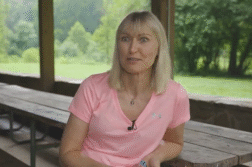ORLANDO, Fla. (Ivanhoe Newswire) – It takes millions, if not billions, of dollars to take a drug from the lab to the pharmacy. Last year out of thousands of drugs in clinical trials, the FDA approved 37, the fewest to pass regulatory scrutiny since 2016. But now, artificial intelligence, or AI, may help to weed out the good from the bad, the drugs that will work and the one’s that won’t, making the time a drug takes to get approval quicker than ever before.
Everywhere you look, everyone seems to be talking about AI. But it doesn’t just help write resumes and papers, AI is also changing the medical world.
“We can cut down the experiments as well as cut down the time,” Material Scientist at the University of Central Florida, Sudipta Seal says.
On average, it takes 10 years to develop a new drug. Now, a team at the University of Central Florida is aiming to speed up that process using an AI based drug screening method they’ve developed.
University of Central Florida computer scientist, Ozlem Garibay explains, “We are working on, basically, trying to model drug and the target protein interactions and then predict their interactions.”
It translates the complex interactions at each drug protein binding site into words. The AI model, then, analyzes that language to learn which part of a virus protein a drug will bind to. With 97 percent accuracy, it can predict how well a drug will work.
“So, you can just, give it, for example, COVID protein and test it against all the FDA approved drugs and see whether or not they bind or not. That’s the beauty of this work,” adds PhD student at UCF’s College of Engineering and Computer Science, Mehdi Yazdani-Jahromi.
It’s called AttentionSiteDTI and is ready to be used right now, for free for anyone developing a new drug.
“I think it’s going to revolutionize medical fields in so many different ways,” Garibay expresses.
Another upside for using AI in drug discovery – the less time in the lab, the lower the cost to create it, and researchers believe that savings could be handed down to the consumer. As for this technology, researchers are now ready to create a website like ChatGPT, making it simple for other scientists to put in their data and see if their drug will work or not.
Contributors to this news report include: Marsha Lewis, Producer; Roque Correa, Videographer & Editor.
To receive a free weekly e-mail on medical breakthroughs from Ivanhoe, sign up at: http://www.ivanhoe.com/ftk
Sources:
http://phrma-docs.phrma.org/sites/default/files/pdf/rd_brochure_022307.pdf
MEDICAL BREAKTHROUGHS
RESEARCH SUMMARY
TOPIC: AI DRUG DISCOVERIES TO CUT COSTS & SAVE LIVES: MEDICINE’S NEXT BIG THING?
REPORT: MB #5249
BACKGROUND: Drug discovery is the process of testing new drugs, or modified drugs, to make sure they are safe and improve patients’ conditions. Drug development can cost nearly $2 billion and is a very tedious process, taking up to 10 to 15 years to get it approved by the FDA for distribution. According to the Biotechnology Innovation Organization, only about 9 percent of new drugs make it to FDA approval.
DRUG DEVELOPMENT IMPACT: With the help of drug development, death from illnesses have decreased tremendously. In 1900, one-third of deaths in the U.S. resulted from one of three diseases: pneumonia, tuberculosis, or diarrhea. With new drugs, in 1940, the chances of dying from either of those was only 1 in 11. In 2000, the risk went significantly down to 1 in 25. Technology has progressed the development even more. Out of those three conditions, only pneumonia remains in the top ten leading causes of death today.
(Source: https://pharmsci.uci.edu/programs/a-short-history-of-drug-discovery/)
NEW TECHNOLOGY: A team of researchers at the University of Central Florida is trying to incorporate artificial intelligence, or AI, to develop, drugs faster and at a lower cost. One of the researchers, Mehdi Yazdani-Jahromi, a PhD student in UCF’s College of Engineering and Computer Science, says, “This enables researchers to use AI to identify drugs more accurately to respond quickly to new diseases. This method also allows the researchers to identify the best binding site of a virus’s protein to focus in on drug design. So, not only will the model they developed called AttentionSiteDTI accelerate the exploration of new medicines, but it can also help repurpose of existing drugs for difference diseases.”
FOR MORE INFORMATION ON THIS REPORT, PLEASE CONTACT:
Robert Wells
If this story or any other Ivanhoe story has impacted your life or prompted you or someone you know to seek or change treatments, please let us know by contacting Marjorie Bekaert Thomas at mthomas@ivanhoe.com




